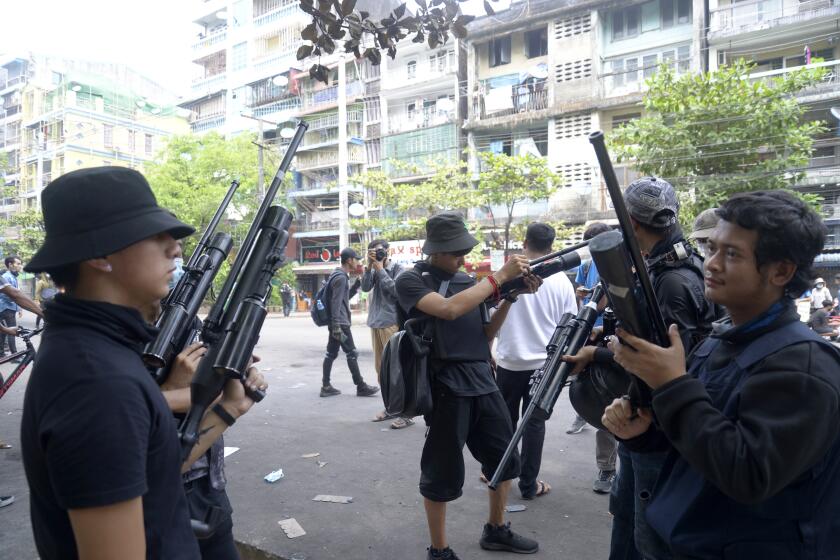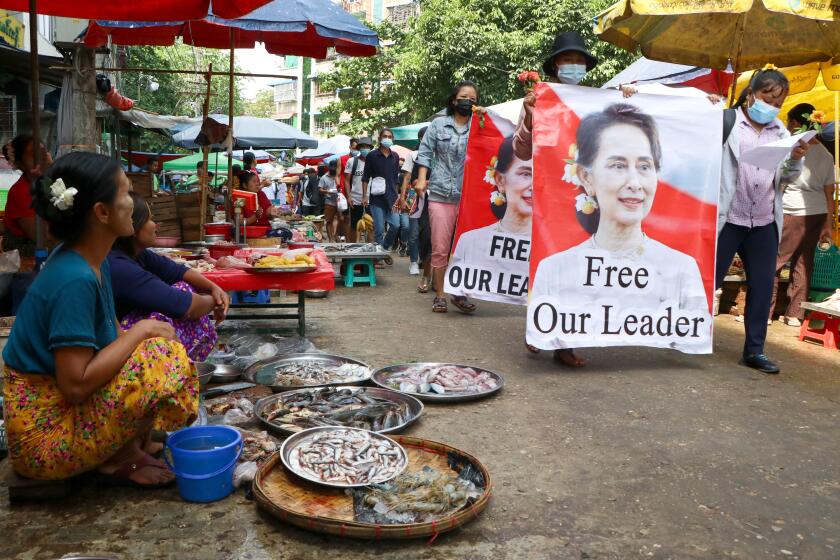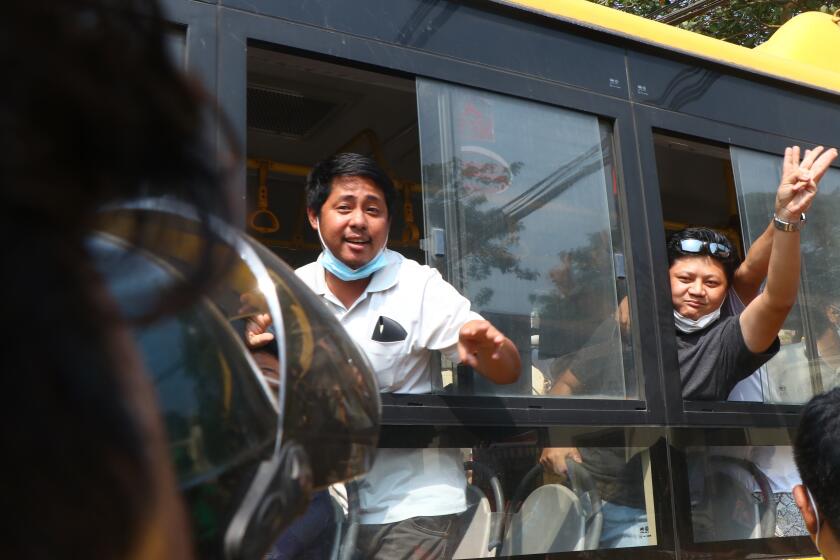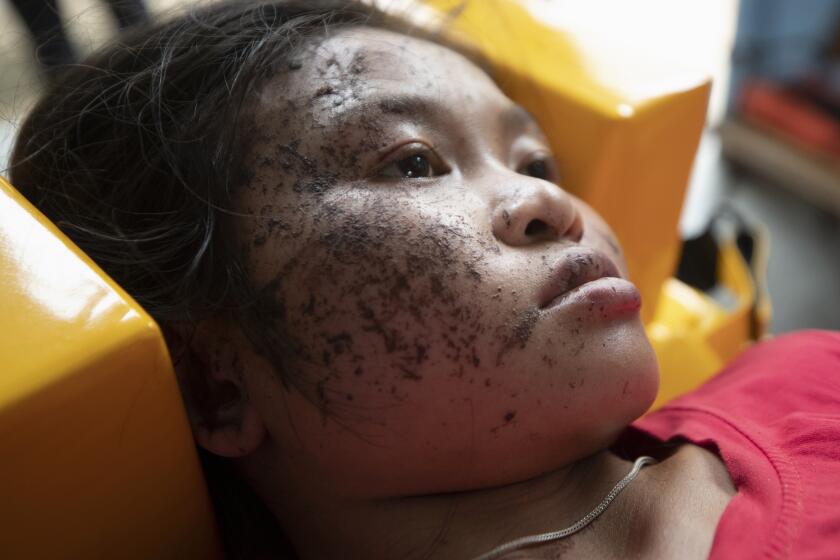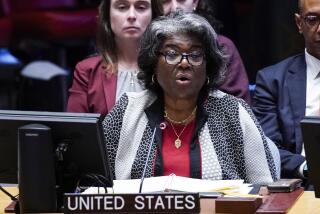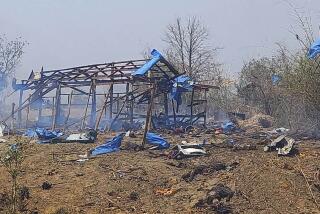U.S. urges arms embargo and sanctions against Myanmar military
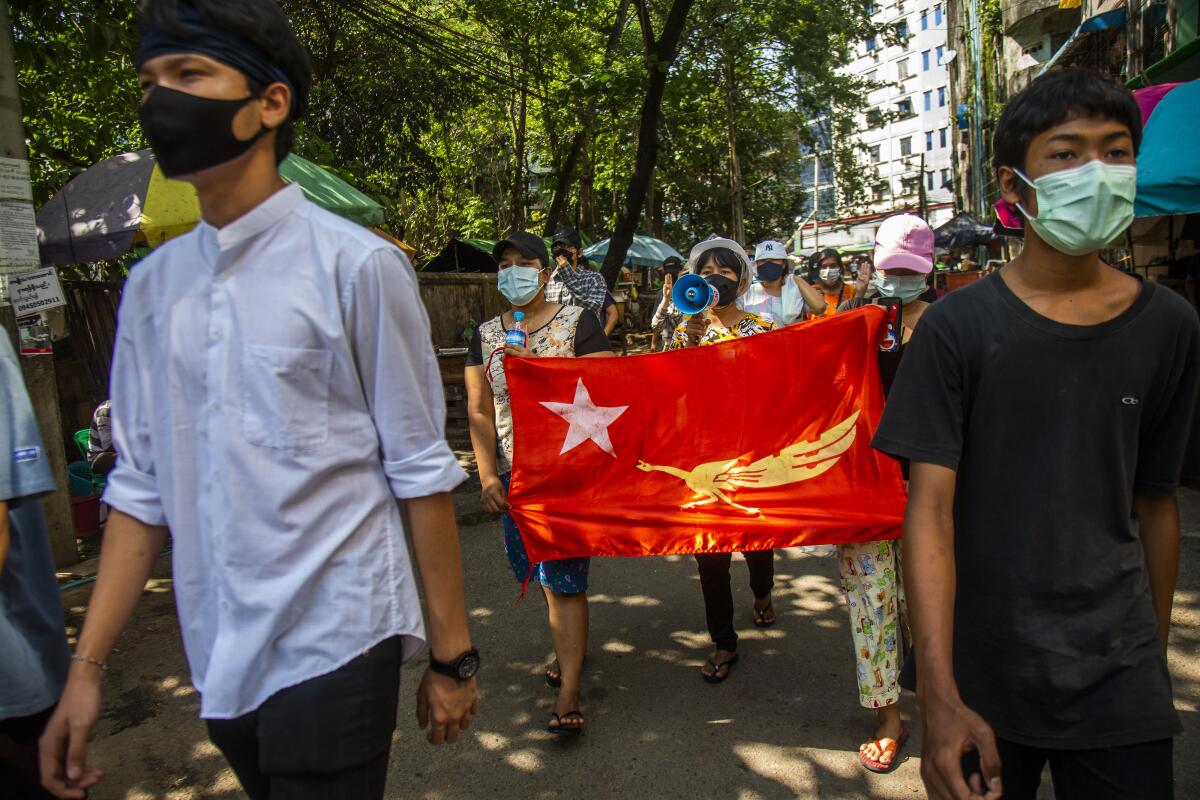
UNITED NATIONS — The U.S. ambassador to the United Nations urged the international community Friday to take “concrete action” against the military in Myanmar, calling for steps including an arms embargo and sanctions against its holding companies and those who profit from them.
Saying such action is the only way to change the military’s crackdown on civilians after its Feb. 1 coup, Linda Thomas-Greenfield made the appeal at an informal virtual meeting of the U.N. Security Council. Zin Mar Aung, a leader of a post-coup committee representing elected members of Myanmar’s parliament, urged all U.N. member nations to increase political, financial and security measures against the military “until the military’s violent attacks on civilians stop and Myanmar returns to the rule of law under civilian and democratic rule.”
Aung said the military has escalated armed violence in the last two weeks in ethnic states including Karen, Shan and Kachin, and before Friday’s council meeting, military forces known as the Tatmadaw used live munitions and rocket-propelled grenades to attack civilians in Bago township in south-central Myanmar.
“The ambulances are not allowed to enter the area even though there have been dozens of civilian casualties,” she said.
The coup reversed years of slow progress toward democracy in Myanmar, also known as Burma, which for five decades had languished under strict military rule that led to international isolation and sanctions. As the generals loosened their grip, culminating in Aung San Suu Kyi’s rise to leadership in 2015 elections, the international community responded by lifting most sanctions and pouring investment into the country.
Anti-coup demonstrators are abandoning peaceful protest for armed resistance as the deposed civilian government appeals to ethnic rebels to join the fight. The United Nations warns of a ‘bloodbath.’
The Security Council has called for a reversal of the coup, strongly condemned the violence against peaceful protesters, called for “utmost restraint” by the military, stressed the need to uphold “democratic institutions and processes” and urged the immediate release of detained government leaders including Suu Kyi and President Win Myint. It also urged military leaders to allow the U.N. special envoy to Myanmar, Christine Schraner Burgener, to visit without preconditions.
But Schraner Burgener, who just arrived in Bangkok, tweeted Friday: “I regret that Tatmadaw answered me yesterday that they are not ready to receive me. I am ready for dialogue. Violence never leads to peaceful sustainable solutions.”
U.N. deputy spokesman Farhan Haq said later Friday that Secretary-General António Guterres still hopes she will be able to visit.
Thomas-Greenfield, the U.S. envoy, said every statement adopted by a united Security Council has been followed by further violence by the military against its people, “and we cannot allow them to succeed.”
Protests against the the coup that ousted the Myanmar government continued Thursday despite the killing of 11 people by security forces a day earlier.
She addressed the people of Myanmar on behalf of the Biden administration: “I want you to know that the United States stands with you. And we will do everything in our power, in coordination with our allies and our partners, here in the Security Council and elsewhere, to help you deal with this terrible situation.”
Thomas-Greenfield said “the military’s brutality” against Rohingya Muslims in Rakhine state three years ago sent hundreds of thousands of people fleeing to Bangladesh, and the current violence has seen thousands flee into Thailand and hundreds try to flee into India.
“I say categorically, we cannot — we simply cannot — allow the military to destabilize the region once again through its unrelenting campaign of violence, their campaign of repression, and especially — especially — against the backdrop of an unprecedented global pandemic,” she said.
“At this point, only concrete action will change the military calculus,” Thomas-Greenfield stressed. “That action can take many forms…. These steps include sanctions against the military, its holding companies, and anyone who seeks to profit off the violence,” an arms embargo, and ensuring “that members of the military who engage in atrocities and other abuses against their own people will be held to account.”
Her call for sanctions against the military was echoed by other Security Council members including Estonia, Norway and Ireland.
Protesters say labor strikes and civil disobedience are the only ways to dislodge the military dictatorship in Myanmar. It may mean pushing millions into poverty.
But Russian diplomat Stanislav Suprunenko objected to the meeting, which was organized by the United Kingdom.
“Unfortunately, this meeting might serve as a reason only to further incite violence while we all should be interested in stabilization of the situation in Myanmar” through launching a dialogue, he said.
The Security Council has strongly supported the 10-member Assn. of Southeast Asian Nations, which includes Myanmar, in taking a leading role in trying to resolve the crisis and restore the country’s democratic transition.
France’s deputy U.N. ambassador, Nathalie Broadhurst, said an emergency ASEAN summit will take place April 20, reportedly in the Indonesian capital, Jakarta.
“We encourage ASEAN members and all other countries to review their financial and other linkages to the military,” Thomas-Greenfield said. “The military needs to feel the costs associated with its horrific actions. The stability and prosperity of the region depends on swift action.”
Violence in eastern Myanmar, including airstrikes that drove thousands in the Karen ethnic minority to flee to Thailand, has increased with new attacks.
Aung, who said she was speaking as acting foreign minister of Myanmar, told the council she was appointed by the Committee Representing Pyidaungsu Hluttaw (the National Assembly), known as CRPH, which represents parliamentarians elected in November’s voting.
She called the current crisis a “fight between the people and the oppressive terrorists” and “between democracy and authoritarianism” and urged the international community to recognize the CRPH and its Federal Democracy Charter, launched April 1, which promotes democracy, gender equality, human rights, collective leadership, nondiscrimination and protection of minority rights.
Aung urged the Security Council “to take immediate concrete action” to pressure the military and protect civilians, warning that continued military violence will lead to more human suffering, economic instability and massive refugee outflows.
Myanmar’s U.N. Ambassador Kyaw Moe Tun, who dramatically opposed the coup in a speech to the General Assembly in late February, urged the Security Council to “please, please, please take action.”
Tun, who remains the U.N. envoy, called for “forcible action without delay through all means necessary and available” to protect the people of Myanmar, including an arms embargo, sanctions, financial freezes, a ban on investments and a no-fly zone to prevent further airstrikes on civilian areas.
“If you wait a day more to take action, the military will kill more people, will commit more brutal acts and will torture more people,” he warned.
More to Read
Sign up for Essential California
The most important California stories and recommendations in your inbox every morning.
You may occasionally receive promotional content from the Los Angeles Times.
